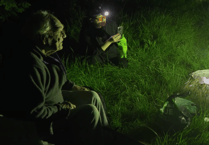IT ALWAYS used to be said that Farnham is full of retired brigadiers and Haslemere full of retired naval captains – and although that is only now partly true, my call last weekend to double our defence spending over a decade was met with much interest in South West Surrey. Why, when the public purse is so tight, did I say what I did?
It is easy when faced with a terrible war such as Ukraine to react in a knee-jerk way. But to be clear, this was a view I have long held. As foreign secretary I called for European countries to match the United States in our commitment to defence in May 2019 because I was concerned about the global decline of democracy.
To recap: the number of fully free countries has now been declining for 16 years, according to Freedom House, with nearly double the world’s population now living under authoritarian rule compared to those lucky enough to live in free democracies.
It has taken the humbling bravery of Ukrainians to remind us what is at stake. But the warning signs were there long ago.
In my first week as foreign secretary I sat round the table at the now-infamous NATO summit at which President Trump nearly walked America away from the alliance.
I came back and asked my officials at the Foreign Office what proportion of European defence was being paid for by American taxpayers. After a lot of work, as such figures are not easily available, the answer came back: between one-third and one-half of Europe’s defence is paid for by the Uncle Sam.
Much as we might wish it otherwise, it is simply not sustainable for NATO countries in Europe to be spending around two per cent of our GDP on defence while expecting America to spend nearly four per cent. If we continue down this path, it won’t just be the more extreme Americans who want to walk away.
The purpose of any increase in spending, though, is not to increase the likelihood of war but reduce it. NATO’s success in the Cold War was based on the principle of deterrence – or peace through strength.
If we are seen as weak, people like President Putin, who have a very different world view, will continue to try to take advantage of our democratic and peace loving ways.
This topic is too big for one column and we will return to it. But let me leave you with one other thought this time.
If we are to win the argument for democracy, it cannot just be about boosting military spend. We need to win hearts across the world as well as minds. And that means looking in the mirror and fixing many of the issues in our own democracies.
One of those is the mechanics of elections where we have allowed technology to become a threat – through algorithm-driven social media and the prevalence of fake news – rather than the asset it should be in giving meaningful power to citizens.
Another is the deep-seated inequality that has persisted, particularly since the financial crisis, and made large chunks of Western populations feel excluded from the prosperity that others appear to enjoy.
We also need to demonstrate that democracies are more committed and better at fixing global problems such as climate change or extreme poverty that belong not to any one country but to all of us.
Peace through strength, then, is not just about the might of our military but the force of our arguments.
If we are to make Ukraine an aberration rather than a permanent step back, we need to show that treating people with dignity and respect in a democratic society is a better way forward not just for wealthy Westerners but for all humanity.





Comments
This article has no comments yet. Be the first to leave a comment.